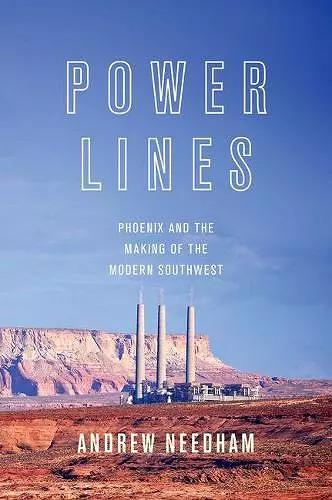Power Lines
Phoenix and the Making of the Modern Southwest
Format:Paperback
Publisher:Princeton University Press
Published:9th Sep '16
Currently unavailable, and unfortunately no date known when it will be back
This paperback is available in another edition too:
- Hardback£45.00(9780691139067)

In 1940, Phoenix was a small, agricultural city of sixty-five thousand, and the Navajo Reservation was an open landscape of scattered sheepherders. Forty years later, Phoenix had blossomed into a metropolis of 1.5 million people and the territory of the Navajo Nation was home to two of the largest strip mines in the world. Five coal-burning power plants surrounded the reservation, generating electricity for export to Phoenix, Los Angeles, and other cities. Exploring the postwar developments of these two very different landscapes, Power Lines tells the story of the far-reaching environmental and social inequalities of metropolitan growth, and the roots of the contemporary coal-fueled climate change crisis. Andrew Needham explains how inexpensive electricity became a requirement for modern life in Phoenix--driving assembly lines and cooling the oppressive heat. Navajo officials initially hoped energy development would improve their lands too, but as ash piles marked their landscape, air pollution filled the skies, and almost half of Navajo households remained without electricity, many Navajos came to view power lines as a sign of their subordination in the Southwest. Drawing together urban, environmental, and American Indian history, Needham demonstrates how power lines created unequal connections between distant landscapes and how environmental changes associated with suburbanization reached far beyond the metropolitan frontier. Needham also offers a new account of postwar inequality, arguing that residents of the metropolitan periphery suffered similar patterns of marginalization as those faced in America's inner cities. Telling how coal from Indian lands became the fuel of modernity in the Southwest, Power Lines explores the dramatic effects that this energy system has had on the people and environment of the region.
Winner of the 2016 George Perkins Marsh Prize, American Society for Environmental History Winner of the 2015 Caughey Western History Prize, Western History Association Winner of a 2015 Southwest Book Award, Border Regional Library Association Winner of the 2015 David J. Weber-Clements Prize, Western History Association Winner of the 2015 Hal K. Rothman Prize, Western History Association "Power Lines is an important contribution to urban, environmental, and western history."--Adam Rome, Journal of American History "A complex and provocative analysis."--Julie Cohn, Environmental History "Needham's disciplined focus on the mechanisms of power in the modern Southwest does much to clarify the origins of modern America--and to demonstrate the utter centrality of indigenous people to that story."--James Rice, AlterNative "Needham's work is remarkable in its ability to draw together a range of actors, sites, scales, and technologies involved in the uneven development of not just Phoenix or the Navajo, but the entire Southwest. By making these connections visible, Power Lines is an important piece of scholarship for those interested in how energy, and electricity in particular, shapes the lives of people located in very different, yet connected, locations."--Conor Harrison, Planning Perspectives "[A] tremendous accomplishment. By weaving together a swarm of previously disconnected histories and historiographies, Power Lines offers a bracing new perspective on energy, development, politics, and protest in the modern Southwest."--Thomas G. Andrews, Western Historical Quarterly "A remarkably complex, sophisticated look at the causes and consequences of metropolitan growth in the American Southwest in the mid-twentieth century... Power Lines achieves a very impressive, relatively concise synthesis of the expansion of the use of electricity in Phoenix in the mid-twentieth century while at the same time introducing original research."--Ben Ford, H-Net Reviews
ISBN: 9780691173542
Dimensions: unknown
Weight: 510g
336 pages